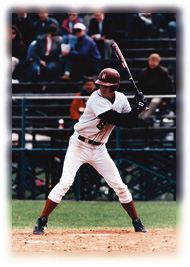![]()
Main Menu ·
Search ·
Current Issue · Contact · Archives · Centennial · Letters to the Editor · FAQs
![]()
Main Menu ·
Search ·
Current Issue · Contact · Archives · Centennial · Letters to the Editor · FAQs

 Crimson captain Peter Albers, shown at bat during a home game, above, crowned a fine season with a grand-slam home run against Princeton. Harvard's baseball field was renamed this spring to honor Joseph J. O'Donnell '67, M.B.A. '71, a College baseball and football star, who endowed the Harvard baseball program two years ago with a $2.5 million gift. Harvard teams have played baseball on the site, formerly Soldiers Field, since 1898.Photograph by Tim Morse
Crimson captain Peter Albers, shown at bat during a home game, above, crowned a fine season with a grand-slam home run against Princeton. Harvard's baseball field was renamed this spring to honor Joseph J. O'Donnell '67, M.B.A. '71, a College baseball and football star, who endowed the Harvard baseball program two years ago with a $2.5 million gift. Harvard teams have played baseball on the site, formerly Soldiers Field, since 1898.Photograph by Tim Morse |
Baseball
At the NCAA Midwest Regional Tournament in Stillwater, Oklahoma, the baseball team (34-16, 18-2 Ivy) opened many eyes with a 7-2 win over UCLA, the nation's fourth-ranked team. Although losses to Oklahoma State and UCLA eventually eliminated Harvard from the tournament--whose winner advances to the College World Series--the upset of the Bruins was a sparkling climax to a superb season of baseball under Joe Walsh, the New England Division I Coach of the Year. In only two seasons, Walsh has taken the Crimson from the Ivy League cellar to its first appearance in the NCAA postseason tournament since 1984.
Harvard won the Ivy League championship this spring, and in the final League game--a 22-4 shelling of Princeton--actually broke the O'Donnell Field scoreboard, which remained stuck at 19 after the Crimson's twentieth runner crossed the plate. The rout decisively settled the three-game series and gave Harvard its first Ivy title since 1985. The biggest blow in the 20-hit attack was a grand-slam home run by captain Peter Albers '97.
This was Harvard's first 30-win season since 1974. Pitcher Frank Hogan '97, who notched the win over UCLA, was named Ivy League Pitcher of the Year.
Softball
With a 32-19-1 mark (8-4 Ivy), the softball team set a school record for most wins in a season. At the ECAC double-elimination tournament, in Fairfield, Connecticut, Harvard was runner-up to Cornell, whom they had beaten twice in the regular season: Harvard took down the Big Red, 8-0, one more time, but fell to them in the championship game, 6-3.
Tennis
The men's tennis team (20-7, 8-1 EITA) bagged another EITA championship, then won the NCAA Region I tournament to move on to the NCAA's round of 16 at UCLA. There, they fell, 4-0, to perennial powerhouse Stanford, which boasted three players among the nation's top 25.
The doubles team of Tom Blake '98 and Mitty Arnold '97 made history by advancing to the semifinals of the NCAA doubles tournament, before falling in three sets to a team from Nevada-Las Vegas. The records are incomplete, but the last time Harvard did so well in a national tournament was probably in the 1920s or 1930s.
The women's team (20-6, 6-1 Ivy) beat every league opponent except Brown. In the NCAA regional tournament, for the second straight year, they fell to top-seeded William and Mary. Sophmore Ivy Wang went on to the NCAA individual singles tournament, and the doubles team of Gabriela Hricko and Gina Majmudar earned a spot in the NCAA doubles draw. Both fell in the first round.
Crew
In the tightest of finishes, the men's lightweight varsity crew (5-0) won the national championship with a victory over Yale at the Intercollegiate Rowing Association regatta. At the finish, the Yale coxswain and stroke celebrated, thinking they'd won--but Harvard had crossed the line eight-tenths of a second earlier.
Yale crew fans and media may have shared the same tendency toward premature exclamation after last year's Bulldog sweep at the Harvard-Yale regatta. This June, Harvard reinstated its dominance (30-5 in varsity races under head coach Harry Parker) by sweeping all three events, coming from behind each time. All three races were upsets. The underdog varsity, which brought a 1-3 record into the race and had finished fourth at the Eastern Sprints to Yale's second, passed the Elis two-and-a-half miles into the four-mile contest and won by a boat length. The biggest surprise came in the JV race, where Harvard's second varsity (1-5 before the race) handed Yale's 6-0 boat its first defeat--by a whopping 14 seconds. Harvard captain Jonathan Feeney '97, troubled by back problems, rowed at #3 in the JV eight.
Earlier in the year, Harvard's varsity lightweights won the Eastern Sprints in convincing fashion, beating both Yale and the defending national champions, Princeton. In July the eight will row in the Henley Royal Regatta in England.
The women's lightweight crew (5-0), which has lost only one regular-season race since 1984, continued their dominance under first-year coach Aubrey Borland. They repeated as national champions, winning the San Diego Crew Classic, the EAWRC Championships, and the IRA Championships along the way.
The women's heavyweight crew (1-5) improved steadily during the year, logging a key victory over Yale in late April. The team finished fourth at the EAWRC Championships, and were eliminated in the semifinals of the NCAA Championships in Sacramento.
Main Menu ·
Search · Current Issue · Contact · Archives · Centennial · Letters to the Editor · FAQs
![]()